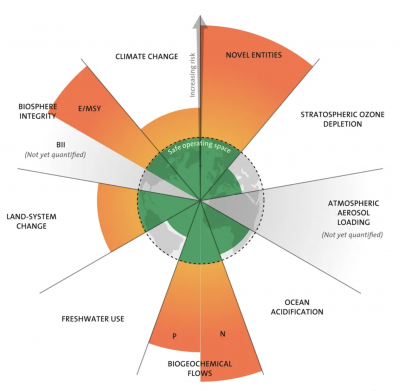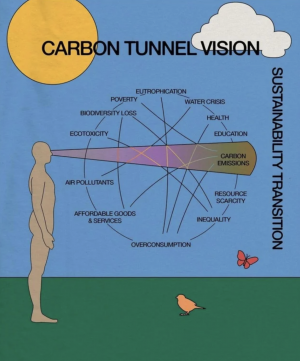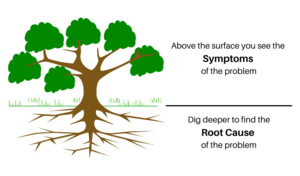Ecological crisis

It's becoming increasingly clear that our singular home—Earth—is under severe strain due to our excessive consumption. In the 1960s, our demands were about three-quarters of what the Earth could replenish in a year. By 2016, we were consuming at a rate of 170 percent of the planet's yearly regenerative capacity[1].
We now find ourselves in a great race: Will we reach a social tipping point to reduce our impact before we hit irreversible global ecological tipping point? While CO2 emissions often take the spotlight (as shown in Figure 1), there are nine key environmental limits to consider (illustrated in Figure 2). Alarmingly, we've already transgressed five of these:
- Biodiversity loss - there has been a 68% average decline in the population sizes of mammals, birds, amphibians, reptiles, and fish between 1970 and 2016[2].
- Nitrogen cycle - ammonia factories (used for water purification, plastics, fabrics, pesticides and dyes) supplement the enzymatic magic of microbial nitrogen fixation with the brute forces of temperature and pressure, extracting close to 100 million metric tons of nitrogen from the atmosphere each year. This results in the creation of Nitrous Oxide which is 200 times more potent as a greenhouse gas than CO2[3].
- Deforestation - more than half the world’s tropical forests have been destroyed since the 1960s[4].
- Ocean acidification - more CO2 in the atmosphere means more acidity in the oceans[5].
- Microplastics via overconsumption - posing a significant threat to the environment, including the wildlife and the ecosystem as a whole[6].
- Climate change - since records began in 1880, nineteen of the twenty hottest years have occurred since 2000[7]. More recently, the 7 hottest days on Earth in the last 100,000+ years all happened in the first week of July 2023[8].
- Ozone depletion, the phosphorus cycle...
Counterarguments
Much of this information is hard to digest as cognitive dissonance would say most of it is some sort of conspiracy or not their problem, below we address each counterargument with some rationale.
"Its a conspiracy."
Climate change is being studied by thousands of independent scientists across the world, they separately critically analyse each other's work through the use of third party verified scientific journals. It would be logistically impossible for all of these researchers to coordinate and participate in a global conspiracy.
"We will innovate out of the crisis."
This is called the ecomodernist argument or technoutopian fallacy, it has been around for centuries. Think about it this way... Imagine you decided to start smoking, a pack a day, maybe two. I might say but that's bad! It will kill you! then you *shrug* and say medicine will find a cure, just as it always has. The underlying message here is if you have been diagnosed with lung cancer the first thing you should do is to stop smoking.
“It’s the government’s problem.”
Climate change is a catastrophic failure by governments. But we are voters, and governments act on our behalf. Many of us are drivers, flyers, and meat-eaters. Morally speaking, we can share responsibility for harms we are part of or those we fail to prevent between us. I’m not saying you (or I) should feel guilty about this unfolding global disaster, but we should feel ashamed. We should act.
"Capitalism has brought a massive increase in the standard of living for all, how can you argue against it?"
There is no doubt that capitalism has brought incredible stuff but it has brought us thus far. We now know that infinite growth in a closed system won't work. We need to see this in the context of the sunk cost fallacy.
"China is responsible for this mess, not us!"
This one is so crazy we have given it its own page.
“It’s too expensive!”
This is the so-called economic argument against mitigating climate change: that it’s cheaper to adjust to a hotter planet. Even if this were factually unassailable (spoiler alert: it’s not), it would be morally flawed. It relies on what philosophers call utilitarianism – the view that we should maximise overall welfare (often, in practice, overall money) even if some people suffer desperately along the way. That’s in direct contradiction to the most basic intuition of common sense morality. It disregards human rights.
Even if we swallowed this pill, it takes another questionable assumption to make the anti-mitigation sums add up. These economic arguments, says the philosopher Simon Caney, assume that future people’s pain, even their deaths, count for less in the cost-benefit calculations if these are further in the future. That isn’t standard economic discounting; it’s discounting the lives of our descendants.
“I’m already vegan and don’t fly.”
This one is the flipside to “it’s all the government’s fault”: putting it all on individuals. That’s inefficient, unfair, and doesn’t work anyway. Going car-free is harder without a good public transport system; leaving mitigation to individuals means putting all the burden on those who happen to make the effort. And individual carbon-cutting, although important, isn’t enough. It won’t avert this catastrophe without governments on board or fossil fuel giants being held accountable. Faced with institutional failure, we shouldn’t feel powerless, but we should all be climate activists, using our own actions to bring about change from above.
“It's too late, I won’t make a difference.”
This is termed the singularity argument. A counterargument to which is: What’s the alternative? Sitting on the sidelines, while others right this collective wrong? That’s not fair on us. The "don't bother keep consuming" narrative is a contagious and profitable message that continually tries to demoralize and demotivate any and all momentum and benefits a very select few.
“Lying in front of lorries isn’t my thing.”
So don’t do that! But perhaps look past the framing that makes you uncomfortable and ask yourself why anyone would feel desperate enough to glue themselves to a road. It’s not because they enjoy it. Then ask what it is that you will do. Write to your MP? Wave banners outside parliament? Demand that your bank or pension fund divest from fossil fuels? Donate to climate justice NGOs? Help us on BurnZero?. Do what you’re good at, as part of a bigger picture.
“I’ve got enough to do already!”
Climate justice isn’t some esoteric goal. It’s about living in a way that doesn’t kill people: doesn’t drown them, burn their homes or give them malaria. So how much money or time or emotional effort should each of us put in for this basic collective morality? I don’t have a final answer because the ethical debate is continuing. But I have an answer that will do for now, for those living comfortably in rich countries. However much we should do to avert this tragedy, it’s more than most of us do now.
Root Cause
In the study of medicine, when a symptom develops, a bad doctor will only treat the symptoms. A good doctor will treat the symptoms whilst looking for the root cause (See Figure 3).
We are currently concentrating on the most pressing symptoms of climate change, our remedy is divesting from fossil fuels and investing in renewables however, this distracts from the other growing symptoms and reduces the collective alarm to persist and address the root cause.
References
- ↑ Jump up to: 1.0 1.1 Underestimating the Challenges of Avoiding a Ghastly Future. Front. Conserv. Sci. Published on 13 January 2021, accessed on 19 June 2022 via: https://doi.org/10.3389/fcosc.2020.615419
- ↑ Nature’s Dangerous Decline ‘Unprecedented’; Species Extinction Rates ‘Accelerating’ May 2019. https://ipbes.net/news/Media-Release-Global-Assessment
- ↑ Effects of Nitrogen Fertilizer Types on Nitrous Oxide Emissions. Martin Burger and Rodney T. Venterea Understanding Greenhouse Gas Emissions from Agricultural Management. January 1, 2011 , 179-202 DOI:10.1021/bk-2011-1072.ch011
- ↑ Deforestation and forest degradation. International Union for Conservation of Nature. Published 2021, February. Accessed via https://www.iucn.org/resources/issues-briefs/deforestation-and-forest-degradation
- ↑ Ocean acidification - National Oceanic and Atmospheric Administration U.S. Department of Commerce. Last updated April 1, 2020, accessed on 1 May 2023 via - https://www.noaa.gov/education/resource-collections/ocean-coasts/ocean-acidification
- ↑ Avoiding a ‘Ghastly Future’: Yale Environment 360: Hard Truths on the State of the Planet. Accessed on 3rd March 2022 via:https://e360.yale.edu/features/avoiding-a-ghastly-future-hard-truths-on-the-state-of-the-planet
- ↑ NASA, Global Temperature. Live data source can be obtained via: https://climate.nasa.gov/vital-signs/global-temperature/
- ↑ Climate Reanalyser dataset, Climate Change Institute, University of Maine: Two meter temperature world Graph. https://climatereanalyzer.org/clim/t2_daily/

